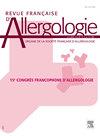Treatment with dupilumab improved quality of life in patients with moderate-to-severe chronic obstructive pulmonary disease and type 2 inflammation: Phase 3 BOREAS trial
IF 0.3
4区 医学
引用次数: 0
Abstract
Prérequis/Contexte
Chronic obstructive pulmonary disease (COPD) significantly impacts a patient's quality of life across physical, emotional, and social aspects. Dupilumab, a human monoclonal antibody, blocks interleukin 4/13 signaling, key and central driver of type 2 inflammation. In BOREAS, dupilumab reduced exacerbation events and improved lung function in patients with COPD and type 2 inflammation. Safety was consistent with the known dupilumab safety profile.
Objectifs
Here, we evaluated the effect of dupilumab on patients’ quality of life in BOREAS.
Méthodes
In phase 3 BOREAS (NCT03930732), patients with COPD, moderate-to-severe airflow limitation, and type 2 inflammation (screening blood eosinophils ≥ 300 cells/μL), on triple therapy, received add-on dupilumab 300 mg every 2 weeks or placebo for 52 weeks. St. George's Respiratory Questionnaire (SGRQ) total and domain scores (activity, symptoms, and impact) were assessed at baseline and Week 52.
Résultats/Discussions
At baseline, mean (standard deviation [SD]) SGRQ total scores were 48.4 (17.0) (dupilumab: n = 468) and 48.4 (17.8) points (placebo: n = 471). For SGRQ domains, baseline scores were 65.1 (19.2) and 64.1 (19.4) (activity), 56.1 (21.0) and 56.6 (21.5) (symptoms), and 36.4 (19.5) and 36.8 (20.2) (impact) for dupilumab and placebo, respectively. At Week 52, dupilumab vs. placebo reduced SGRQ scores as follows: total 38.5 (19.0) vs. 42.1 (18.5), activity 54.3 (23.2) vs. 58.9 (22.0), symptoms 43.5 (24.5) vs. 47.3 (24.4), and impact 27.8 (19.5) vs. 30.6 (19.6). Change from baseline to Week 52 in SGRQ total score was significantly greater with dupilumab vs. placebo (least squares mean difference vs. placebo − 3.4 [95% CI: −5.4, −1.3]; P = 0.0017) and nominally significant across all domains, including activity (−4.6 [−7.2, −2.0]; P = 0.0005), symptoms (−3.4 [−6.0, −0.7]; P = 0.0121), and impact (−2.6 [−4.8, −0.3]; P = 0.0242).
Conclusion
In patients with moderate-to-severe COPD and type 2 inflammation, dupilumab significantly improved quality of life over the 52-week treatment period as measured by SGRQ total and domain scores.
dupilumab治疗改善了中重度慢性阻塞性肺疾病和2型炎症患者的生活质量:3期BOREAS试验
慢性阻塞性肺疾病(COPD)在身体、情感和社会方面显著影响患者的生活质量。Dupilumab是一种人单克隆抗体,可阻断白细胞介素4/13信号,这是2型炎症的关键和中心驱动因素。在BOREAS中,dupilumab减少了COPD和2型炎症患者的加重事件并改善了肺功能。安全性与已知的dupilumab安全性一致。目的在此,我们评估dupilumab对BOREAS患者生活质量的影响。在3期BOREAS (NCT03930732)中,患有COPD、中重度气流受限和2型炎症(筛查血液嗜酸性粒细胞≥300细胞/μL)的患者接受三联治疗,每2周接受额外的dupilumab 300 mg或安慰剂治疗52周。在基线和第52周评估圣乔治呼吸问卷(SGRQ)总分和领域评分(活动、症状和影响)。r sultats/DiscussionsAt基线,平均(标准差[SD]) SGRQ总分为48.4(17.0)分(dupilumab: n = 468)和48.4(17.8)分(安慰剂:n = 471)。对于SGRQ域,dupilumab和安慰剂的基线评分分别为65.1(19.2)和64.1(19.4)(活性),56.1(21.0)和56.6(21.5)(症状),36.4(19.5)和36.8(20.2)(影响)。在第52周,dupilumab与安慰剂相比,SGRQ评分降低如下:总评分38.5(19.0)比42.1(18.5),活度54.3(23.2)比58.9(22.0),症状43.5(24.5)比47.3(24.4),影响27.8(19.5)比30.6(19.6)。从基线到第52周,dupilumab与安慰剂组的SGRQ总分变化显著大于安慰剂组(最小二乘平均差值与安慰剂组为- 3.4 [95% CI: - 5.4, - 1.3];P = 0.0017),并且在所有领域都具有名义上的显著性,包括活动(- 4.6 [- 7.2,- 2.0];P = 0.0005),症状(- 3.4 [- 6.0,- 0.7];P = 0.0121),影响(- 2.6 [- 4.8,- 0.3];p = 0.0242)。根据SGRQ总分和域评分,在中重度COPD和2型炎症患者中,dupilumab在52周的治疗期间显著改善了生活质量。
本文章由计算机程序翻译,如有差异,请以英文原文为准。
求助全文
约1分钟内获得全文
求助全文
来源期刊

Revue Francaise d Allergologie
Medicine-Immunology and Allergy
自引率
33.30%
发文量
349
期刊介绍:
La Revue Française d''Allergologie : un véritable forum pour faire connaître des travaux originaux et permettre la diffusion de l''information auprès de toutes les spécialités concernées par les pathologies allergiques. La Revue Française d''Allergologie (8 numéros par an) est au carrefour de nombreuses spécialités - dermatologie, pédiatrie, ORL, pneumologie, ophtalmologie, médecine interne - qui, toutes, ont à traiter des maladies allergiques. Les symptômes des allergies fondés sur des mécanismes communs sont le plus souvent associés et se succèdent chez un même patient. En forte progression depuis 20 ans, les maladies allergiques sont dans l''attente de perfectionnements et d''avancées thérapeutiques qui permettront aux nombreux patients qui en sont atteints de mieux vivre avec leurs allergies. La Revue Française d''Allergologie se veut donc un véritable forum de discussions et d''échanges entre tous les spécialistes confrontés aux pathologies
 求助内容:
求助内容: 应助结果提醒方式:
应助结果提醒方式:


